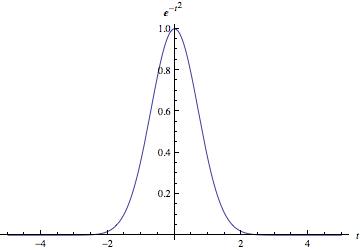|
Yamada–Watanabe Theorem
The Yamada–Watanabe theorem is a result from probability theory saying that for a large class of stochastic differential equations a ''weak solution'' with ''pathwise uniqueness'' implies a ''strong solution'' and ''uniqueness in distribution''. In its original form, the theorem was stated for n-dimensional ''Itô equations'' and was proven by Toshio Yamada and Shinzo Watanabe in 1971. Since then, many generalizations appeared particularly one for general semimartingales by Jean Jacod from 1980. Yamada–Watanabe theorem History, generalizations and related results Jean Jacod generalized the result to SDEs of the form :dX_t=u(X,Z)dZ_t, where (Z_t)_ is a semimartingale and the coefficient u can depend on the path of Z. Further generalisations were done by Hans-Jürgen Engelbert (1991) and Thomas G. Kurtz (2007). For SDEs in Banach spaces there is a result from Martin Ondrejat (2004), one by Michael Röckner, Byron Schmuland and Xicheng Zhang (2008) and one by Stefan Tap ... [...More Info...] [...Related Items...] OR: [Wikipedia] [Google] [Baidu] |
Probability Theory
Probability theory or probability calculus is the branch of mathematics concerned with probability. Although there are several different probability interpretations, probability theory treats the concept in a rigorous mathematical manner by expressing it through a set of axioms of probability, axioms. Typically these axioms formalise probability in terms of a probability space, which assigns a measure (mathematics), measure taking values between 0 and 1, termed the probability measure, to a set of outcomes called the sample space. Any specified subset of the sample space is called an event (probability theory), event. Central subjects in probability theory include discrete and continuous random variables, probability distributions, and stochastic processes (which provide mathematical abstractions of determinism, non-deterministic or uncertain processes or measured Quantity, quantities that may either be single occurrences or evolve over time in a random fashion). Although it is no ... [...More Info...] [...Related Items...] OR: [Wikipedia] [Google] [Baidu] |
Stochastic Differential Equation
A stochastic differential equation (SDE) is a differential equation in which one or more of the terms is a stochastic process, resulting in a solution which is also a stochastic process. SDEs have many applications throughout pure mathematics and are used to model various behaviours of stochastic models such as stock prices,Musiela, M., and Rutkowski, M. (2004), Martingale Methods in Financial Modelling, 2nd Edition, Springer Verlag, Berlin. random growth models or physical systems that are subjected to thermal fluctuations. SDEs have a random differential that is in the most basic case random white noise calculated as the distributional derivative of a Brownian motion or more generally a semimartingale. However, other types of random behaviour are possible, such as jump processes like Lévy processes or semimartingales with jumps. Stochastic differential equations are in general neither differential equations nor random differential equations. Random differential equation ... [...More Info...] [...Related Items...] OR: [Wikipedia] [Google] [Baidu] |
Toshio Yamada (mathematician)
is a Japanese politician of the Liberal Democratic Party, a member of the House of Councillors in the Diet (national legislature). Career A native of Oyabe, Toyama and a graduate of Waseda University Waseda University (Japanese: ), abbreviated as or , is a private university, private research university in Shinjuku, Tokyo. Founded in 1882 as the Tōkyō Professional School by Ōkuma Shigenobu, the fifth Prime Minister of Japan, prime ministe ..., he was elected for the first time in 2007. References * External links Official websitein Japanese. Members of the House of Councillors (Japan) Waseda University alumni 1946 births Living people Liberal Democratic Party (Japan) politicians {{Japan-politician-1940s-stub ... [...More Info...] [...Related Items...] OR: [Wikipedia] [Google] [Baidu] |
Shinzo Watanabe
Shinzō Watanabe (渡辺 信三 Watanabe Shinzō, born 23 December 1935) is a Japanese mathematician, who has made fundamental contributions to probability theory, stochastic processes and stochastic differential equations. He is revered as a luminary in the field of modern probability theory and stochastic calculus. The pioneering book “Stochastic Differential Equations and Diffusion Processes” he wrote with Nobuyuki Ikeda has attracted a lot of researchers into the area and is known as the “Ikeda-Watanabe” for researchers in the field of stochastic analysis. He serves as the editor of Springer Mathematics. Biography Watanabe received his bachelor's degree from Kyoto University in 1958 and completed his Ph.D. under Kiyosi Itô in 1963. Watanabe subsequently became a professor at Kyoto University. After that, he moved to Ritsumeikan University and hold the full-time faculty position there until his retirement. He was also a visiting professor at Stanford University a ... [...More Info...] [...Related Items...] OR: [Wikipedia] [Google] [Baidu] |
Semimartingale
In probability theory, a real-valued stochastic process ''X'' is called a semimartingale if it can be decomposed as the sum of a local martingale and a càdlàg adapted finite-variation process. Semimartingales are "good integrators", forming the largest class of processes with respect to which the Itô integral and the Stratonovich integral can be defined. The class of semimartingales is quite large (including, for example, all continuously differentiable processes, Brownian motion and Poisson processes). Submartingales and supermartingales together represent a subset of the semimartingales. Definition A real-valued process ''X'' defined on the filtered probability space (Ω,''F'',(''F''''t'')''t'' ≥ 0,P) is called a semimartingale if it can be decomposed as :X_t = M_t + A_t where ''M'' is a local martingale and ''A'' is a càdlàg adapted process of locally bounded variation. This means that for almost all \omega \in \Omega and all compact intervals ... [...More Info...] [...Related Items...] OR: [Wikipedia] [Google] [Baidu] |
Jean Jacod
Jean Jacod (born 1944) is a French mathematician specializing in stochastic processes and probability theory. He has been a professor at the Université Pierre et Marie Curie. He has made fundamental contributions to a wide range of topics in probability theory including stochastic calculus, limit theorems, martingale problems, Malliavin calculus and statistics of stochastic processes. Biography Jean Jacod graduated from Ecole Polytechnique in 1965 and obtained his Doctorat d'État in Mathematics from the Université Paris-VI. His advisor was Jacques Neveu. Selected bibliography * * *J. JACOD, P. PROTTER: Asymptotic error distributions for the Euler method for stochastic differential equations. Ann. Probab., 26, 267-307 (1998). *J. JACOD: Non-parametric kernel estimation of the diffusion for a diffusion process. Scand. J. Statist. 27, 83-96 (2000). * E. EBERLEIN, J. JACOD, S. RAIBLE: Levy term structure models: no–arbitrage and completeness. Finance and Stochastics, 9, 6 ... [...More Info...] [...Related Items...] OR: [Wikipedia] [Google] [Baidu] |
Thomas G
Thomas may refer to: People * List of people with given name Thomas * Thomas (name) * Thomas (surname) * Saint Thomas (other) * Thomas Aquinas (1225–1274) Italian Dominican friar, philosopher, and Doctor of the Church * Thomas the Apostle * Thomas (bishop of the East Angles) (fl. 640s–650s), medieval Bishop of the East Angles * Thomas (Archdeacon of Barnstaple) (fl. 1203), Archdeacon of Barnstaple * Thomas, Count of Perche (1195–1217), Count of Perche * Thomas (bishop of Finland) (1248), first known Bishop of Finland * Thomas, Earl of Mar (1330–1377), 14th-century Earl, Aberdeen, Scotland Geography Places in the United States * Thomas, Idaho * Thomas, Illinois * Thomas, Oklahoma * Thomas, Oregon * Thomas, South Dakota * Thomas, Virginia * Thomas, Washington * Thomas, West Virginia * Thomas County (other) * Thomas Township (other) Elsewhere * Thomas Glacier (Greenland) Arts and entertainment * ''Thomas'' (Burton novel), a 196 ... [...More Info...] [...Related Items...] OR: [Wikipedia] [Google] [Baidu] |
Banach Space
In mathematics, more specifically in functional analysis, a Banach space (, ) is a complete normed vector space. Thus, a Banach space is a vector space with a metric that allows the computation of vector length and distance between vectors and is complete in the sense that a Cauchy sequence of vectors always converges to a well-defined limit that is within the space. Banach spaces are named after the Polish mathematician Stefan Banach, who introduced this concept and studied it systematically in 1920–1922 along with Hans Hahn and Eduard Helly. Maurice René Fréchet was the first to use the term "Banach space" and Banach in turn then coined the term " Fréchet space". Banach spaces originally grew out of the study of function spaces by Hilbert, Fréchet, and Riesz earlier in the century. Banach spaces play a central role in functional analysis. In other areas of analysis, the spaces under study are often Banach spaces. Definition A Banach space is a complete nor ... [...More Info...] [...Related Items...] OR: [Wikipedia] [Google] [Baidu] |
Michael Röckner
Michael Röckner is a mathematician working in the fields of Stochastic analysis and Mathematical Physics. He obtained his PhD at the University of Bielefeld in 1984 under the supervision of Sergio Albeverio and Christopher John Preston Christopher is the English version of a Europe-wide name derived from the Greek name Χριστόφορος (''Christophoros'' or '' Christoforos''). The constituent parts are Χριστός (''Christós''), "Christ" or "Anointed", and φέρει .... Together with Claudia Prévôt, he wrote the book ''A Concise Course on Stochastic Partial Differential Equations''. * References Living people 20th-century German mathematicians Probability theorists Year of birth missing (living people) 21st-century German mathematicians Sir Edmund Whittaker Memorial Prize winners Presidents of the German Mathematical Society {{Germany-mathematician-stub ... [...More Info...] [...Related Items...] OR: [Wikipedia] [Google] [Baidu] |
Predictable Process
In stochastic analysis, a part of the mathematical theory of probability, a predictable process is a stochastic process whose value is knowable at a prior time. The predictable processes form the smallest class that is closed under taking limits of sequences and contains all adapted left-continuous processes. Mathematical definition Discrete-time process Given a filtered probability space (\Omega,\mathcal,(\mathcal_n)_,\mathbb), then a stochastic process (X_n)_ is ''predictable'' if X_ is measurable with respect to the σ-algebra \mathcal_n for each ''n''. Continuous-time process Given a filtered probability space (\Omega,\mathcal,(\mathcal_t)_,\mathbb), then a continuous-time stochastic process (X_t)_ is ''predictable'' if X, considered as a mapping from \Omega \times \mathbb_ , is measurable with respect to the σ-algebra generated by all left-continuous adapted processes. This σ-algebra is also called the predictable σ-algebra. Examples * Every dete ... [...More Info...] [...Related Items...] OR: [Wikipedia] [Google] [Baidu] |
Brownian Motion
Brownian motion is the random motion of particles suspended in a medium (a liquid or a gas). The traditional mathematical formulation of Brownian motion is that of the Wiener process, which is often called Brownian motion, even in mathematical sources. This motion pattern typically consists of Randomness, random fluctuations in a particle's position inside a fluid sub-domain, followed by a relocation to another sub-domain. Each relocation is followed by more fluctuations within the new closed volume. This pattern describes a fluid at thermal equilibrium, defined by a given temperature. Within such a fluid, there exists no preferential direction of flow (as in transport phenomena). More specifically, the fluid's overall Linear momentum, linear and Angular momentum, angular momenta remain null over time. The Kinetic energy, kinetic energies of the molecular Brownian motions, together with those of molecular rotations and vibrations, sum up to the caloric component of a fluid's in ... [...More Info...] [...Related Items...] OR: [Wikipedia] [Google] [Baidu] |
Filtration (probability Theory)
In the theory of stochastic processes, a subdiscipline of probability theory, filtrations are totally ordered collections of subsets that are used to model the information that is available at a given point and therefore play an important role in the formalization of random (stochastic) processes. Definition Let (\Omega, \mathcal A, P) be a probability space and let I be an index set with a total order \leq (often \N , \R^+ , or a subset of \mathbb R^+ ). For every i \in I let \mathcal F_i be a sub-''σ''-algebra of \mathcal A . Then : \mathbb F:= (\mathcal F_i)_ is called a filtration, if \mathcal F_k \subseteq \mathcal F_\ell for all k \leq \ell . So filtrations are families of ''σ''-algebras that are ordered non-decreasingly. If \mathbb F is a filtration, then (\Omega, \mathcal A, \mathbb F, P) is called a filtered probability space. Example Let (X_n)_ be a stochastic process In probability theory and related fields, a stochastic () or rand ... [...More Info...] [...Related Items...] OR: [Wikipedia] [Google] [Baidu] |


